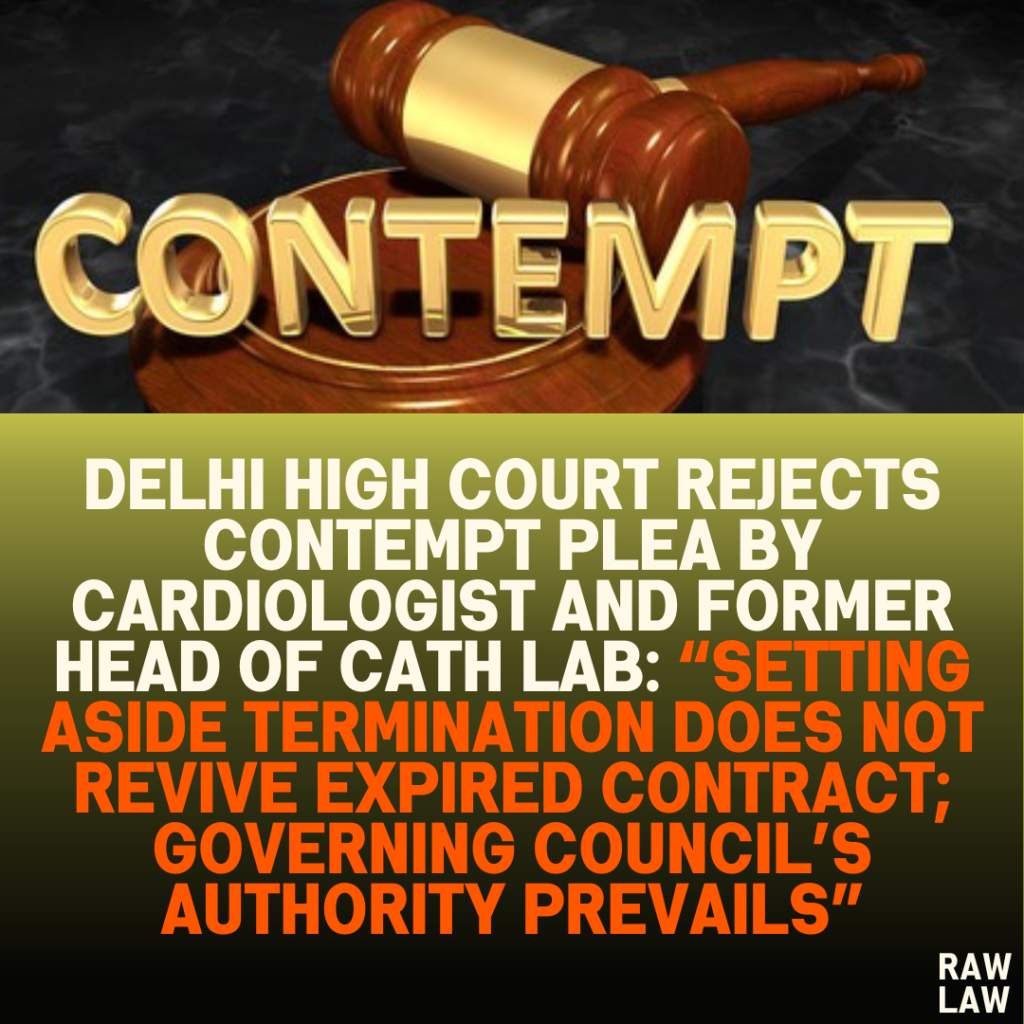Court’s Decision:
The Delhi High Court dismissed the contempt petition filed under Section 11 of the Contempt of Courts Act, 1971, for alleged willful disobedience of its earlier directions. The court held that there was no willful, deliberate, or contumacious disobedience of its order dated 16.11.2023. The Court further recognized the authority of the Governing Council (GC) in making employment decisions, noting that the petitioner did not have a vested right to seek renewal of the expired contract.
Facts:
The petitioner, a cardiologist and former head of the Cath Laboratory and Cardiology Department at a government hospital in Delhi, was terminated through orders issued on 09.03.2022 and relieved on 10.03.2022. Aggrieved by these orders, the petitioner filed a writ petition challenging the termination. The Single Judge of the High Court set aside the termination orders on 16.11.2023, holding that they were issued by an incompetent authority. The petitioner then sought to rejoin his position, but the respondents denied the request on the grounds that his contract had already expired and no clearances had been received for renewal.
Issues:
- Whether the respondents’ refusal to permit the petitioner to rejoin his position constituted contempt of court.
- Whether the decision of the Governing Council not to renew the petitioner’s contract post-expiration was valid.
- Whether the judgment dated 16.11.2023 required the respondents to reinstate the petitioner.
Petitioner’s Arguments:
- The petitioner argued that the termination and relieving orders were illegal, backdated, and issued without affirmation by the Competent Authority while he was actively attending to his duties.
- It was contended that the respondents, despite the High Court’s order setting aside the termination, refused to comply, thereby committing contempt of court.
- The petitioner claimed that the respondents relied on rejected Governing Council decisions to prevent his reinstatement and did not follow the due process required under the CCS Conduct Rules.
Respondent’s Arguments:
- The respondents contended that the petitioner’s contract expired on 28.02.2022, and the termination order was merely a formality reflecting this fact.
- They argued that the judgment dated 16.11.2023 only set aside the termination on technical grounds, as it was issued by an incompetent authority, and did not mandate renewal of the contract.
- The respondents emphasized that the Governing Council’s decision dated 26.12.2022 required clearances from Delhi Police and the Delhi Medical Council for any renewal, and these were not received.
Analysis of the Law:
The court noted that while the orders of termination were set aside due to technical incompetence, the GC had the ultimate authority to decide on the petitioner’s employment status. The High Court emphasized that merely setting aside the orders did not equate to a directive for automatic reinstatement, particularly in light of the fact that the petitioner’s contract had already expired. The decision in Union of India v. Satish Joshi was cited to affirm that there is no vested right for the renewal of a contract once it has expired.
Precedent Analysis:
The court referred to several precedents, including D.K.C. v. K.C., where it was held that defiance of a court’s order should involve a clear act of willful disobedience. The court also distinguished the present case from Standard Chartered Bank v. Directorate of Enforcement, emphasizing that the factual matrix here did not show any violation of statutory obligations akin to the FERA violations in the cited case.
Court’s Reasoning:
The Court reasoned that the petitioner’s contract had expired before the termination orders were issued. Setting aside the termination on technical grounds did not revive an expired contract. The court observed that the petitioner had no automatic right to reinstatement in the absence of the necessary clearances. Since the GC’s authority was recognized, and the judgment did not mandate reappointment, the respondents’ refusal could not be seen as contempt.
Conclusion:
The High Court concluded that there was no wilful disobedience or deliberate non-compliance with its order. The decision of the Governing Council was found to be reasonable and legally sustainable. Accordingly, the contempt petition was dismissed, along with any pending applications.
Implications:
The ruling reiterates that a technical defect in termination does not automatically revive an expired contract, and employees cannot seek automatic reinstatement unless the court explicitly directs it. The judgment affirms that competent authorities, such as the GC in this case, retain the right to assess employment decisions based on objective and rational grounds, even when earlier procedural errors are found. This decision serves as a reminder for employees and legal practitioners about the limitations of contempt proceedings and the importance of challenging employment decisions on substantive grounds.




Pingback: Jharkhand High Court Reiterates Structured Formula for Compensation Under Section 163A of Motor Vehicles Act: "Future Prospects Cannot Be Added to Income in Claims Under Section 163A Except for Deceased Minors Below 15 Years" - Raw Law
Pingback: Jharkhand High Court Modifies Sentence Due to Protracted Litigation and Absence of Criminal Antecedents—Conviction for Rioting, Theft, and Causing Hurt Affirmed, Sentence Reduced to Period Already Undergone - Raw Law